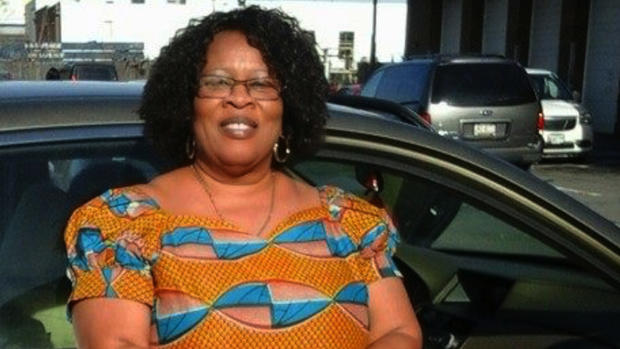Grandmother's Death Highlights Growing Trend Of Canadian Border Crossings
MINNEAPOLIS (WCCO) -- A grandmother dies in Northern Minnesota less than a quarter mile from the Canadian border.
The story made news around the world last month and only highlights a skyrocketing trend among immigrant populations seeking protection up north.
Mavis Otuteye, 57, stayed in the US after her Visa expired. Her daughter lives in Canada and had recently given birth. While investigators still don't know what her intentions were by trying to cross into Canada, they are certain of the dangers.
WCCO got a rare glimpse at the growing trend of travel that border patrol agents and immigrant advocates are grappling with along the Minnesota, Canadian border.
Scott Webster keeps a 100-mile stretch of land in his sights every day as the Deputy Patrol Agent in charge of the Pembina, North Dakota Border Patrol Station.
About half of those miles land in Minnesota.
"This is the area where the majority of the people cross," Webster said.
It's also the area where Mavis Otuteye's journey made international headlines.
Originally from Ghana, the grandmother disappeared from her home in Delaware a week before a missing person's report made its way to the Kittson County Sheriff's Department just before the Memorial Day weekend.
"The pilots were able to see the backpack and clothing back to the southwest. From that point, the agents on ATVs followed the sign across the fields to this location," Webster said.
Within just a few hours of getting the call border patrol agents found her body here in a drainage ditch. So close to the Canadian border you can see it. It's just a few hundred yards away.
"She was found face down in the water about half way between here and the river," he said.
US Customs reports show Otuteye came to Baltimore in 2003. When her visitor's visa expired three years later, she stayed in the US. Her daughter had recently given birth in Toronto. Otuteye secretly left the east coast for Northern Minnesota, where it appears she died of hypothermia before making it to Canada.
"I'm just bewildered I guess. I don't know understand she would risk trying to cross the open field in the middle of the night in unknown terrain. I just don't understand it," Webster said.
Her death has spotlighted what was once a sporadic trek for individuals with varying immigration statuses in the US. Scott Webster says in the past, his agents would record about a dozen such people crossing the border all summer.
Since January he said that number stands at about 600. But, when we asked why he said he wouldn't talk politics.
As Deputy Director of The Advocates for Human Rights, Michele Garnett McKenzie can freely answer that question, pointing the finger at the new US President.
"On the other side we've seen the US tenor of the immigration discussion really turn into one driven by fear of bans and of walls, one that would not suggest that someone would be welcome here," Garnett McKenzie said.
Garnett McKenzie says the messaging has led to confusion among immigrant populations. While Canadian law has been more progressive, the country doesn't have an open door.
The Safe Third Country Agreement between Canada and the US regulates when people can seek asylum. It says individuals must claim asylum in the first country they're in, allowing border officers in Canada to turn away asylum seekers if they're from the US.
"It's really a horror and a tragedy to have that happen right here in our backyard," she said.
Garnett McKenzie believes what happened to Otuteye only underscores the need for change.
"The reality is we have a system that is set up specifically to exclude some people based on who they are. If we're not going to step up to that protection call we are going to see more tragedies," Garnett McKenzie said.
Webster also believes this should serve as a wake-up call surrounding a subject that he says for so long people didn't want to talk about: keeping better tabs on our borders.
"I'm glad that there's a spotlight on us," he said.
As northern Minnesota fields represent a crossroads for a growing number of families.
Patrol agents believe border crossers are drawn to the flat, open space in Northern Minnesota and don't believe crossing will be dangerous in that area. Or, they won't get caught.
Attorneys say Otuteye may have qualified to enter Canada legally at an official border crossing under a family member exception in that Safe Third Country Agreement.




